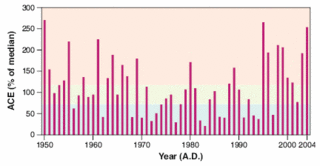
Within hours of Hurricane Katrina's landfall on the Gulf Coast, various individuals were already stepping up to the mike to score political points. Munich's Sueddeutsche Zeitung stated in an editorial:
"Just as Sept. 11 clearly showed that America is vulnerable, it will likely take a couple more hurricanes of the magnitude of Katrina before America changes its appalling environmental policies. . ."
Meanwhile, Germany's environment minister Juergen Trittin, wrote:
"The American president closes his eyes to the economic and human damages that are inflicted on his country and the world economy by natural disasters, like Katrina, through neglected climate protection."
Now, I'm no particular fan of George W. Bush, and I'm certainly in the camp of people who are aware that humans are indeed causing changes in the global climate, but to argue that this particular disaster was due to global warming or a specific political stance regarding global warming policy is absurd.
The ACE index of hurricane intensity certainly shows an increase in recent years (above; from Trenberth, 17 JUNE 2005 VOL 308 SCIENCE), but overall the data are marked by substantial variability, and one is hard pressed to find anything about recent years that is remarkable given history. Furthermore, even if one argues that Katrina was marginally larger than she would have been in the absence of global warming, the history of fossil fuel use and its climate effects cannot be tied to a single country or its president.
On the subject of New Orleans, hurricanes, and climate change, I wrote the following earlier this year (in the April edition of Catastrophe Risk Management):
"changes in extremes have the potential to increase damages at the margins.Yet, the major driver of the future economic and public health consequences of severe weather will continue to be the socio-economic factors that control the exposure of people and property to extreme events. The city of New Orleans, for example lies 1.5-3.0 meters (5-10 feet) below sea level, making it one of the most vulnerable areas in the United States to hurricanes. The city’s flood defenses are built to withstand a category 3 hurricane. Global warming will raise sea levels and may cause a slight increase in the probability that a future hurricane steering toward the city exceeds the category 3 threshold. But the primary risk factors are New Orleans’ geographic and geologic position, its population size and density, the value of associated property and future decisions regarding the management of risk."
All the greenhouse gas mitigation in the world would not have reduced the population of New Orleans, expanded the city's flood defenses, or raised the city above sea-level. The city has always been a sitting duck, and it always will be. Ignoring this fact to score political points on the global warming issue shows at best a misunderstanding of the big picture and at worst is an attempt to take advantage of the misunderstanding of others.






No comments:
Post a Comment